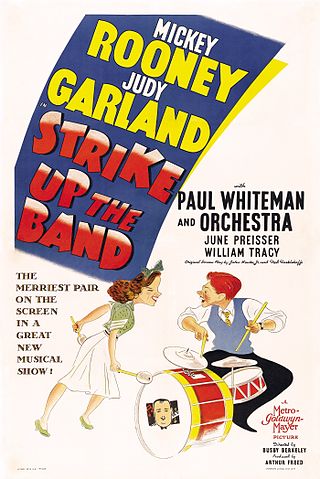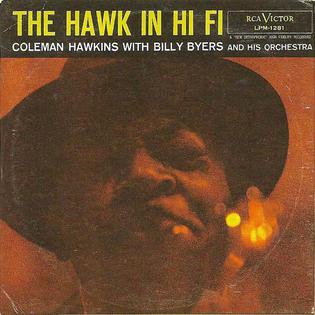
Richard Charles Rodgers was an American composer who worked primarily in musical theater. With 43 Broadway musicals and over 900 songs to his credit, Rodgers was one of the most well-known American composers of the 20th century, and his compositions had a significant influence on popular music.

James Francis Durante was an American comedian, actor, singer, and pianist. His distinctive gravelly speech, Lower East Side accent, comic language-butchery, jazz-influenced songs, and prominent nose helped make him one of the United States' most familiar and popular personalities of the 1920s through the 1970s. He often referred to his nose as the schnozzola, and the word became his nickname.

This is a list of notable events in music that took place in the year 1927.

Rodgers and Hart were an American songwriting partnership between composer Richard Rodgers (1902–1979) and the lyricist Lorenz Hart (1895–1943). They worked together on 28 stage musicals and more than 500 songs from 1919 until Hart's death in 1943.

The Hollywood Palace is an hourlong American television variety show broadcast Saturday nights on ABC from January 4, 1964, to February 7, 1970. Titled The Saturday Night Hollywood Palace for its first few weeks, it began as a midseason replacement for The Jerry Lewis Show, another variety show, which lasted only three months.

Ned Wayburn(néEdward Claudius Weyburn; 30 March 1874 – 2 September 1942) was an American choreographer.

The Hippodrome Theatre, also called the New York Hippodrome, was a theater located on Sixth Avenue between West 43rd and West 44th Streets in the Theater District of Midtown Manhattan in New York City. The theater operated from 1905 to 1939 and was called the world's largest theater by its builders, with a seating capacity of 5,300 and a stage measuring 100 by 200 feet. It had state-of-the-art theatrical technology, including a tank built into the stage apron that could be filled with water for aquatic performances.

Billy Rose's Jumbo is a 1962 American musical film released by Metro-Goldwyn-Mayer and starring Doris Day, Stephen Boyd, Jimmy Durante, and Martha Raye. An adaptation of the stage musical Jumbo produced by Billy Rose, the film was directed by Charles Walters, written by Sidney Sheldon, and featured Busby Berkeley's choreography. It was nominated for an Academy Award for the adaptation of its Rodgers and Hart score.
"The Most Beautiful Girl in the World" is a show tune from the 1935 Rodgers and Hart musical Jumbo when it was introduced by Gloria Grafton and William J. McCartney.

'Billy Rose's Jumbo' is the soundtrack album to the 1962 film of the same name: featuring Doris Day, Stephen Boyd, Jimmy Durante, and Martha Raye. Columbia Masterworks Records released the recording on November 12, 1962, under catalog numbers OL-5860 and OS-2260 (stereophonic). "Over and Over Again" was released as a single on CBS with "This Can't Be Love" as the B-side.
"I Didn't Know What Time It Was" is a popular song composed by Richard Rodgers with lyrics by Lorenz Hart for the 1939 musical Too Many Girls. Introduced by Richard Kollmar and Marcy Westcott in the stage musical, early hit versions were recorded by Benny Goodman and by Jimmy Dorsey .
It was then performed by Trudy Erwin and Richard Carlson in the 1940 film adaptation produced by RKO. The song was later interpolated into the score of the 1957 film Pal Joey, sung by Frank Sinatra, and has become a jazz standard.
"Little Girl Blue" is a popular song with music by Richard Rodgers and lyrics by Lorenz Hart, published in 1935. The song was introduced by Gloria Grafton in the Broadway musical Jumbo.

Hollywood Party, also known under its working title of The Hollywood Revue of 1933 and Star Spangled Banquet, is a 1934 American pre-Code musical film starring Laurel and Hardy, The Three Stooges, Jimmy Durante, Lupe Vélez and Mickey Mouse. It was distributed by Metro-Goldwyn-Mayer. Each sequence featured a different star with a separate scriptwriter and director assigned.

Babes in Arms is the 1939 coming of age American film version of the 1937 Broadway musical of the same title. Directed by Busby Berkeley, it stars Mickey Rooney and Judy Garland, and features Charles Winninger, Guy Kibbee, June Preisser, Grace Hayes, and Betty Jaynes. It was Garland and Rooney's second film together as lead characters after their earlier successful pairing in the fourth of the Andy Hardy films. The film concerns a group of youngsters trying to put on a show to prove their vaudevillian parents wrong and make it to Broadway. The original Broadway script was significantly revamped, restructured, and rewritten to accommodate Hollywood's needs. Almost all of the Rodgers and Hart songs from the Broadway musical were discarded.
"There's a Small Hotel" is a 1936 song composed by Richard Rodgers, with lyrics by Lorenz Hart. Originally written for but dropped from the musical Billy Rose's Jumbo (1935), it was used in On Your Toes (1936), where it was introduced by Ray Bolger and Doris Carson, and repeated by Jack Whiting and Vera Zorina in the London West End production that opened on 5 February 1937, at the Palace Theatre.

Strike Up the Band is a 1940 American musical film produced by the Arthur Freed unit at Metro-Goldwyn-Mayer. The film was directed by Busby Berkeley and stars Mickey Rooney and Judy Garland, in the second of a series of musicals they co-starred in, after Babes in Arms, all directed by Berkeley. The story written for the 1927 stage musical Strike Up the Band, and its successful 1930 Broadway revision, bear no resemblance to this film, aside from the title song.

Swing jazz emerged as a dominant form in American music, in which some virtuoso soloists became as famous as the band leaders. Key figures in developing the "big" jazz band included bandleaders and arrangers Count Basie, Cab Calloway, Jimmy and Tommy Dorsey, Duke Ellington, Benny Goodman, Fletcher Henderson, Earl Hines, Glenn Miller, and Artie Shaw. Duke Ellington and his band members composed numerous swing era hits that have become standards: "It Don't Mean a Thing " (1932), "Sophisticated Lady" (1933) and "Caravan" (1936), among others.

The period from the end of the First World War until the start of the Depression in 1929 is known as the "Jazz Age". Jazz had become popular music in America, although older generations considered the music immoral and threatening to cultural values. Dances such as the Charleston and the Black Bottom were very popular during the period, and jazz bands typically consisted of seven to twelve musicians. Important orchestras in New York were led by Fletcher Henderson, Paul Whiteman and Duke Ellington. Many New Orleans jazzmen had moved to Chicago during the late 1910s in search of employment; among others, the New Orleans Rhythm Kings, King Oliver's Creole Jazz Band and Jelly Roll Morton recorded in the city. However, Chicago's importance as a center of jazz music started to diminish toward the end of the 1920s in favor of New York.
The Jumbo Fire Chief Program is an American old-time radio program starring Jimmy Durante, Donald Novis and Gloria Grafton. The series originated from WEAF radio in New York and was broadcast nationally over the Red Network of the National Broadcasting Company. The series was based on Billy Rose's musical circus act Jumbo which premiered on Broadway in November 1935 and a continuation of sponsor Texaco's The Fire Chief, a radio program starring Ed Wynn that ended its three-year run several months before Jumbo' s premiere. The program starred Jimmy Durante as Claudius "Brainy" Bowers, the overzealous circus promoter of the Consodine circus act who usually gets the show in financial crisis due to his over exaggeration of the show's profits, and Donald Novis and Gloria Grafton as young love interests Matt Mulligan, Jr. and Mickey Consodine. Mickey is the daughter of unheard character John Consodine, the owner of the circus act.

The Hawk in Hi Fi is an album by saxophonist Coleman Hawkins with an orchestra arranged and conducted by Billy Byers. It was recorded in early 1956 and released on the RCA Victor label.















